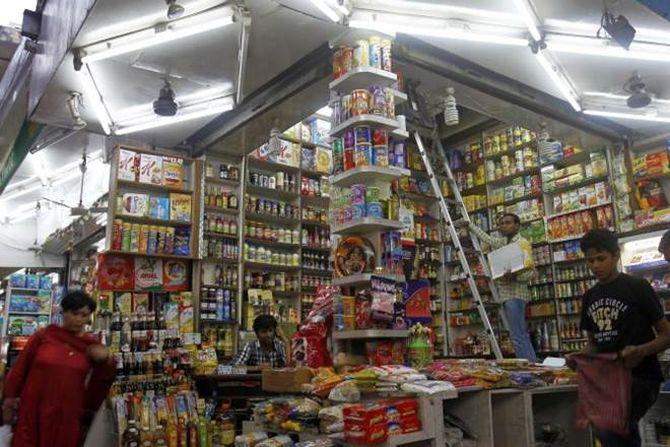The country’s top FMCG stocks, such as Hindustan Unilever, ITC, Nestlé, Britannia, Godrej Consumer Products, and Dabur, among others, are currently trading at around 41x their trailing 12-month earnings, down from their peak P/E multiple of around 48x at the end of December 2018.

Stocks of fast-moving consumer goods (FMCG) firms have begun losing some of their sheen, as volume growth slows in the industry.
There has been sharp decline in the valuation premium that FMCG stocks enjoyed over the broader market, even as investors fret over the industry’s earnings trajectory, given a broader slowdown in consumer demand.
The price-to-earnings (P/E) premium of FMCG stocks over the Nifty is now down to an 11-year low of 16.5x, from 22.6x a year ago.
In the last 12 months, there has been de-rating of FMCG stocks on the bourses, against a P/E expansion in the broader market.
“Volume growth in the industry - that was 11-12 per cent till a year ago - has now shrunk to 6-7 per cent for most FMCG firms.
"This raises a question mark over their ability to generate strong double-digit growth in earnings, leading to some sell-off in richly valued FMCG stocks,” says Shailendra Kumar, chief investment officer, Narnolia Financial Advisors.
The country’s top FMCG stocks, such as Hindustan Unilever, ITC, Nestlé, Britannia, Godrej Consumer Products, and Dabur, among others, are currently trading at around 41x their trailing 12-month earnings, down from their peak P/E multiple of around 48x at the end of December 2018.
In the same period, the NSE Nifty50 companies’ trailing P/E multiple is up is nearly 150 basis points (bps) to 26.7x, as the index made a fresh new high.
As a result, the FMCG premium over Nifty50 in terms of P/E ratio declined to a 35-quarter low or nearly an 11-year low of 14.5x.
Such a low premium was last seen during January-March 2011, when the market rally was more broad-based and the overall corporate earnings were growing in strong double digits.
At its peak, the top average P/E ratio in the FMCG sector was nearly twice that of Nifty stocks.
For example, FMCG stocks in the Business Standard sample were trading at a P/E ratio of 46.6x during the June 2018 quarter, against the Nifty’s average trailing P/E ratio of 22.8x in that quarter.
As their valuation contracts, FMCG stocks are not leaders on the bourses for the first time in years.
There was little contribution from the FMCG stocks to the incremental rise in the broader markets in the past 12 months.
The top eight FMCG stocks in the Business Standard sample added only around Rs 21,000 crore, or 1.8 per cent to their combined market capitalisation (m-cap) since December 2018.
In contrast, the index companies’ combined m-cap is up by Rs 12.2 trillion, or 15.5 per cent during the same period.
According to Kumar, the broader market is now being led by lenders, especially corporate banks.
“Investor money is now moving to cyclical corporate banks, such as ICICI Bank, State Bank of India, and Axis Bank. Investors believe the worse is behind them, given a steady decline in their bad assets ratio and some recoveries.
"They are expected to report faster earnings growth,” says Kumar.
Consumer stocks were the top gainers in 2018 with a 22.6 per cent year-on-year (YoY) rise in their m-cap, following 32 per cent YoY gains in 2017.
In the same period, the Nifty rose 3.2 per cent and 28 per cent, respectively.
For others, it is part of a cycle that occurs in every rally.
“There was lot of risk aversion till recently and investors sought safety in steady earnings growth and debt-free balance sheets that FMCG stocks provided.
"Risk appetite is now back, and investors are betting on sectors and stocks with beaten-down valuations,” G Chokkalingam, founder and MD of Equinomics Research & Advisory Services, said.
According to him, the risk on trade favours mid- and small-cap stocks, besides many front line and large-cap stocks that saw huge value erosion in 2019.
Photograph: PTI Photo










